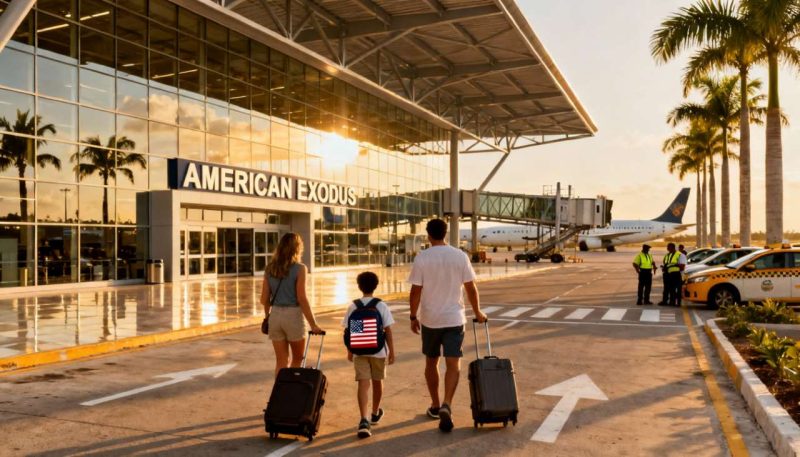
Americans are not just doomscrolling anymore. They are buying plane tickets, applying for passports, and imagining new lives outside the United States. The pattern is anecdotal but increasingly visible. Parents, LGBTQ+ families, academics, and professionals are seeking a way out to escape the drumbeat of school shootings, an atmosphere of political violence, and a social culture that feels toxic and unstable.
Emigration advisers in Europe report a clear spike in requests from U.S. clients since Donald Trump’s return to the White House. France and Ireland have seen record levels of visa and citizenship applications from Americans, while the U.K. has logged its highest naturalization requests since 2004 Reuters reports. In human terms, we are talking about teachers in Barcelona who once worked in North Carolina, researchers taking “scientific asylum” in Marseille, and whole families ripping up their roots to protect children from an atmosphere they consider unsafe.
As someone who has lived in the Caribbean for the past twenty years, I hear these stories too. Neighbors, parents at the international schools, retirees who once thought they would spend their golden years in Arizona or Florida now settling in places like Barbados or St. Lucia. Again and again the conversations circle back to fear. “I cannot handle the thought of my grandkids doing active-shooter drills,” one woman from Michigan told me over coffee. Another father from New Jersey put it plainly: “We are not running from taxes, we are running from guns.”
Politics Is Getting Deadlier
This exodus is not happening in an emotional vacuum. The assassination of conservative activist Charlie Kirk at a Utah campus, the attempted assassination of Trump during the 2024 campaign, and targeted attacks on lawmakers and journalists have made American politics feel physically dangerous. Threats against members of Congress have more than doubled since 2017. Experts warn that lone-actor violence and intimidation are rising as acceptable tools of political expression.
The trendline for school safety is just as disturbing. Gun-related incidents on K-12 campuses were once rare. Before 2021, the annual number did not surpass 124. By 2023, according to researchers, that figure had soared to 351. Over 160 school incidents have already been recorded this year (as per NPR). For American parents, every school day brings a shadow calculation. If you grow up in the Caribbean, like my own children did, the closest equivalent is hurricane drills, not lockdowns. That contrast explains a lot about why more and more families tell me they plan to stay in the islands permanently.
Why The Exit Feels Different Now
- School shootings now feel structural rather than episodic. The data show a clear shift after COVID. Parents describe the new normal as dread baked into the school calendar.
- Political violence is bleeding into everyday civic life. Town halls, universities, and places of worship are not spared. The boundary between “politics” and daily living has eroded.
- Policy volatility is fueling long-term decisions. Immigration, LGBTQ+ rights, and even the definition of legal gender markers on passports have become experiments in executive power. A child’s safety, identity, or education can swing overnight depending on who holds office.
Systemic Failure Beneath the Headlines
America’s policies create perverse incentives. Nearly half of gun-owning households with children report storing at least one firearm unlocked or loaded. National legislation on safe storage remains elusive despite bipartisan voter support. The result is what families describe to me as an environment where ordinary mistakes or disputes can escalate into funerals.
On the political side, gerrymandering and closed primaries amplify extremism over compromise. Social media and disinformation accelerate paranoia. The country is functionally rewarding confrontation while punishing restraint.
Could Anything Reverse the Outflow?
If the United States wants to keep its families, the solutions are obvious but politically radioactive. Universal background checks, red-flag laws, and stronger storage requirements should be the minimum. Primary reform and independent redistricting would reduce the tribalization of politics. Academic and scientific institutions should be protected from ideological purges rather than targeted.
In other words, safety has to be delivered as legislation, not marketed as vibes.
What This Means Globally
Europe in particular sees opportunity. Universities offer “scientific asylum” programs. Remote Caribbean nations quietly welcome disillusioned professionals whose dollars and expertise ripple through local economies. America’s brain drain becomes their windfall.
I see this locally every year. A new neighbor from Pennsylvania landing in Antigua after selling his suburban home at a loss. A teacher from California arriving in Dominica because she “wants her kids to feel free walking to school.” Each story reflects both a retreat from America’s failures and a cautious embrace of societies that still feel livable.
If the U.S. continues this trajectory, it risks becoming a country of exits rather than arrivals. And it will be hard to persuade the next generation to stay and fix the house if the house itself keeps catching fire.
